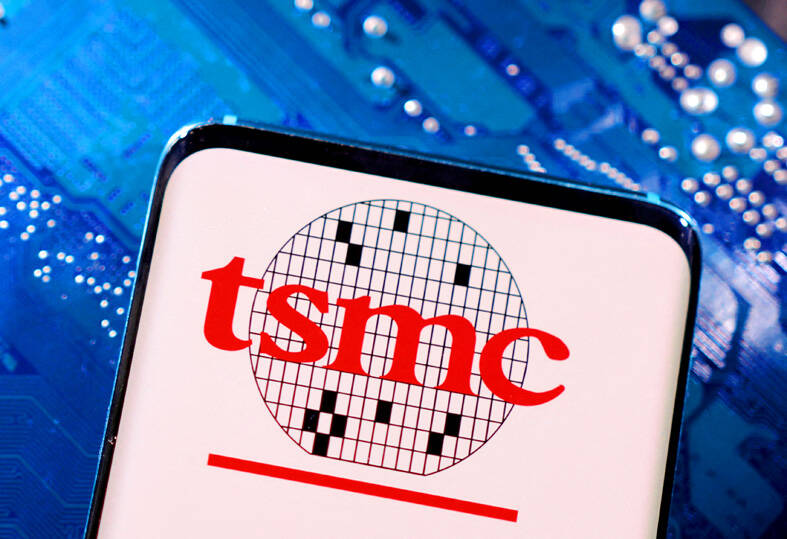Taiwan Semiconductor Manufacturing Co (TSMC, 台積電) remained the top invention patent applicant in Taiwan in the first quarter of this year, outpacing all local and foreign applicants, the Intellectual Property Office said on Thursday.
TSMC filed 752 invention patents, up 4 percent from a year earlier, marking the fourth consecutive year the chipmaker claimed the first place in the first quarter.
Patents are categorized into three groups in Taiwan: invention, design and utility model. Invention patents are considered the most important in terms of new technology ideas.

Photo: Reuters
Smartphone IC designer MediaTek Inc (聯發科) took second place among local applicants with 146 invention patent applications, up 121 percent from a year earlier, the highest rate of growth among local firms.
DRAM chip supplier Nanya Technology Corp (南亞科技) was third with 115 invention patent applications, up 17 percent from a year earlier, followed by flat-panel makers Innolux Corp (群創) and AUO Corp (友達), which filed 101 and 94 applications, up 3 percent and 7 percent respectively.
The office said it was the first time Innolux has filed more than 100 invention patent applications in a single quarter.
Rounding out the top 10 local applicants were communication network IC designer Realtek Semiconductor Corp (瑞昱半導體), with 77 applications, down 28 percent; contract notebook computer maker Inventec Corp (英業達) with 55 applications, up 17 percent; Chunghwa Telecom Co (中華電信) with 45 applications, up 50 percent, memorychip supplier Macronix International Co (旺宏電子) with 42 applications, down 9 percent; and the government-sponsored Industrial Technology Research Institute with 42 applications, up 5 percent.
Among foreign applicants, Applied Materials Inc reclaimed the top spot after nine years by filing 182 invention patent applications, down 12 percent from a year earlier. It was followed by Japanese electrical product maker Nitto Denko Corp with 176 applications, up 18 percent; US-based smartphone IC designer Qualcomm Inc with 169 applications, down 30 percent; South Korea’s Samsung Electronics Co with 166 applications, up 44 percent; and Japanese semiconductor supplier Tokyo Electron Ltd with 128 applications, down 10 percent.
In the first quarter, 12,486 invention patent applications were filed, little changed from a year earlier, the office said.
The number of invention, utility model and design patent applications totaled 17,226 in the first quarter, down 2 percent from a year earlier, it added.

Sweeping policy changes under US Secretary of Health and Human Services Robert F. Kennedy Jr are having a chilling effect on vaccine makers as anti-vaccine rhetoric has turned into concrete changes in inoculation schedules and recommendations, investors and executives said. The administration of US President Donald Trump has in the past year upended vaccine recommendations, with the country last month ending its longstanding guidance that all children receive inoculations against flu, hepatitis A and other diseases. The unprecedented changes have led to diminished vaccine usage, hurt the investment case for some biotechs, and created a drag that would likely dent revenues and

Global semiconductor stocks advanced yesterday, as comments by Nvidia Corp chief executive officer Jensen Huang (黃仁勳) at Davos, Switzerland, helped reinforce investor enthusiasm for artificial intelligence (AI). Samsung Electronics Co gained as much as 5 percent to an all-time high, helping drive South Korea’s benchmark KOSPI above 5,000 for the first time. That came after the Philadelphia Semiconductor Index rose more than 3 percent to a fresh record on Wednesday, with a boost from Nvidia. The gains came amid broad risk-on trade after US President Donald Trump withdrew his threat of tariffs on some European nations over backing for Greenland. Huang further

CULPRITS: Factors that affected the slip included falling global crude oil prices, wait-and-see consumer attitudes due to US tariffs and a different Lunar New Year holiday schedule Taiwan’s retail sales ended a nine-year growth streak last year, slipping 0.2 percent from a year earlier as uncertainty over US tariff policies affected demand for durable goods, data released on Friday by the Ministry of Economic Affairs showed. Last year’s retail sales totaled NT$4.84 trillion (US$153.27 billion), down about NT$9.5 billion, or 0.2 percent, from 2024. Despite the decline, the figure was still the second-highest annual sales total on record. Ministry statistics department deputy head Chen Yu-fang (陳玉芳) said sales of cars, motorcycles and related products, which accounted for 17.4 percent of total retail rales last year, fell NT$68.1 billion, or

MediaTek Inc (聯發科) shares yesterday notched their best two-day rally on record, as investors flock to the Taiwanese chip designer on excitement over its tie-up with Google. The Taipei-listed stock jumped 8.59 percent, capping a two-session surge of 19 percent and closing at a fresh all-time high of NT$1,770. That extended a two-month rally on growing awareness of MediaTek’s work on Google’s tensor processing units (TPUs), which are chips used in artificial intelligence (AI) applications. It also highlights how fund managers faced with single-stock limits on their holding of market titan Taiwan Semiconductor Manufacturing Co (TSMC, 台積電) are diversifying into other AI-related firms.